#CloudComputingCourses
Explore tagged Tumblr posts
Text
Advance Your Skills with the Best Cloud Computing Courses in Bangalore – RACE REVA University
In the rapidly evolving world of technology, cloud computing has emerged as one of the most sought-after skills. From startups to multinational corporations, businesses are leveraging the power of cloud technology to scale operations, enhance security, and drive innovation. If you're looking to build a rewarding career in this cutting-edge field, enrolling in cloud computing courses in Bangalore could be your gateway to success.
Why Choose Bangalore for Cloud Courses?
Bangalore, often referred to as the Silicon Valley of India, is a hub for tech innovation. The city houses some of the biggest names in the IT industry, including global cloud giants like Amazon Web Services (AWS), Microsoft Azure, and Google Cloud. With its thriving tech ecosystem, Bangalore offers unmatched opportunities for aspiring cloud professionals to learn, network, and grow.
RACE, REVA University – Leading the Way in Cloud Education
RACE (REVA Academy for Corporate Excellence) at REVA University stands out as a premier institution offering industry-focused programs designed to bridge the gap between academia and real-world industry needs. The MSc in Cloud Architecture and Security is one of the flagship programs that prepares students for a dynamic career in cloud computing and cybersecurity.
Key Highlights of the Program:
Comprehensive Curriculum: The course covers core topics such as cloud infrastructure, virtualization, cloud service models, and advanced cybersecurity strategies.
Hands-on Training: Gain practical experience with leading cloud platforms, enabling you to build, deploy, and manage cloud-based solutions.
Expert Faculty: Learn from industry veterans and academic experts who bring real-world insights to the classroom.
Industry Partnerships: Collaborate with top tech companies through internships, live projects, and corporate mentorship programs.
State-of-the-Art Infrastructure: Access cutting-edge labs and tools to enhance your learning experience.
Career Opportunities in Cloud Computing
Upon completing the program at RACE, REVA University, you'll be well-equipped to pursue roles such as:
Cloud Solutions Architect
Cloud Security Specialist
DevOps Engineer
Cloud Consultant
IT Infrastructure Manager
With the demand for cloud professionals skyrocketing, the MSc in Cloud Architecture and Security can set you apart in a competitive job market.
Why Now Is the Best Time to Enroll?
The adoption of cloud computing is accelerating across industries, from healthcare to e-commerce. By enrolling in a cloud computing course in Bangalore, you position yourself at the forefront of this digital revolution. As businesses continue to migrate to the cloud, skilled professionals will play a pivotal role in shaping the future of technology.
Explore Your Potential with RACE, REVA University
Take the first step towards an exciting career in cloud computing by joining the MSc in Cloud Architecture and Security at RACE, REVA University. With its strong focus on practical learning and industry relevance, this program is your pathway to success in the ever-expanding world of cloud technology.
Don’t wait—visit RACE, REVA University’s MSc in Cloud Architecture and Security to learn more and apply today!
Transform your passion for technology into a rewarding career with one of the best cloud courses in Bangalore. The future is in the cloud—are you ready to reach for it?
#CloudComputingCourses#CloudCoursesInBangalore#REVAUniversity#RaceREVA#CloudArchitecture#CloudSecurity#TechEducation#CloudTechnology#MScInCloudComputing#CloudCareer#UpskillWithCloud#FutureOfTech#BangaloreTechCourses#LearnCloudComputing#CloudCertifications#CloudSkills#ITTrainingBangalore#CloudInnovation#CyberSecurityCourses#AWSAzureGCP
0 notes
Text
Cloud Computing Courses in Nagpur and Pune: Your Path to Success

In today’s fast-paced digital world, cloud computing has become a vital component of modern businesses. Whether you're looking to advance your career or stay competitive in the tech industry, enrolling in cloud computing courses can be a game-changer. If you're in Nagpur or Pune, you're in luck! There are excellent cloud computing courses in Nagpur and cloud computing classes in Pune that provide you with the skills to thrive in this field.
What Are the Benefits of This Course?
Hands-on Experience: Gain practical experience with leading cloud platforms such as AWS, Google Cloud, and Microsoft Azure.
Enhanced Understanding: Develop a deeper knowledge of cloud architecture, security, and deployment.
Up-to-date Skills: Learn about the latest tools and technologies in cloud computing, keeping you current with industry standards.
Increased Employability: Position yourself as a valuable asset to companies adopting cloud technologies.
Improved Salary Potential: Enhance your earning potential with skills in high demand in the job market.
Why Choose This Course?
Cloud computing isn’t just a trend; it’s the future of IT infrastructure. Businesses are shifting from traditional data centers to cloud-based solutions due to cost efficiency, scalability, and flexibility. By mastering cloud skills through cloud computing classes in Pune, you will be ready to meet the demands of this growing market. Whether you're an IT professional, software developer, or even a business analyst, learning cloud computing opens doors to endless opportunities.
Who Should Attend?
IT Professionals: Perfect for IT professionals seeking to deepen their cloud expertise.
Developers and Engineers: Ideal for developers and engineers aiming to advance their skills in cloud technologies.
Business Managers: Suitable for business managers interested in understanding and leveraging cloud solutions.
Career Changers: Valuable for those looking to transition into a tech career or shift to cloud computing.
Students: Great for students wanting to gain a competitive edge in the IT industry.
Conclusion
Cloud computing is transforming industries worldwide, and acquiring expertise in this field can propel your career to new heights. Whether you're in Nagpur or Pune, enrolling in a cloud computing course is a powerful step toward securing a future in an exciting, high-demand industry. These courses offer a blend of theoretical knowledge and hands-on experience that will enable you to not only understand cloud technologies but also apply them to solve real-world problems.
Now’s the time to make a move toward this in-demand skill set. With businesses around the globe increasingly adopting cloud solutions, your expertise in cloud computing will ensure that you're not only relevant but essential in today’s job market. Invest in yourself, learn cloud computing, and unlock endless career possibilities!
#CloudComputingCourses#CloudComputingNagpur#CloudComputingPune#TechSkills#CloudClassesPune#CareerInCloudComputing#LearnCloudTechnology#CloudCertification#CloudSkills#PuneITTraining
0 notes
Text

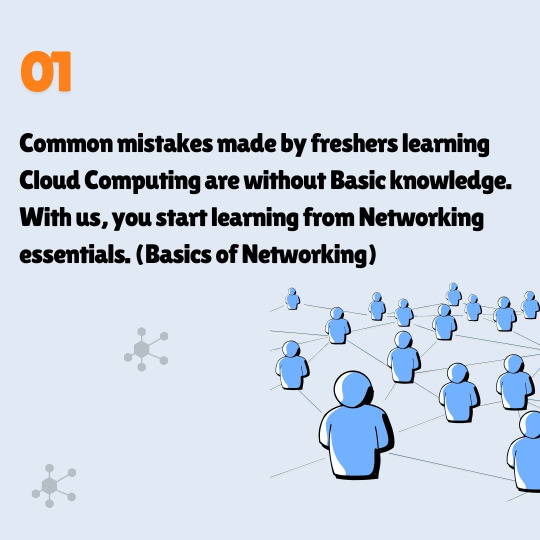

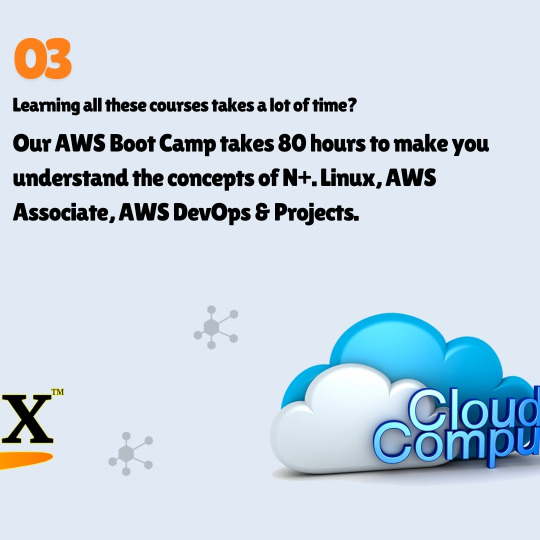
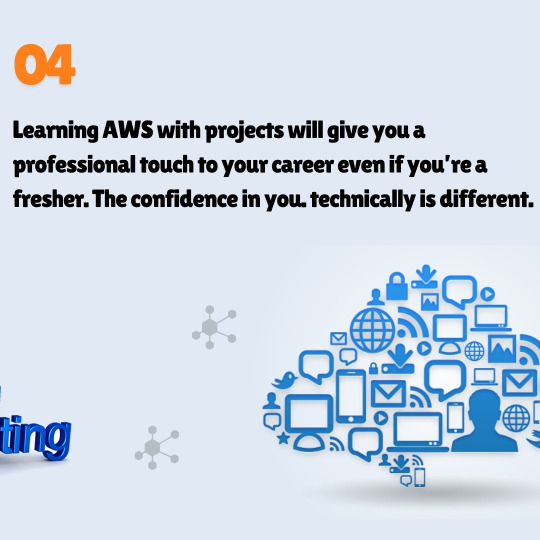

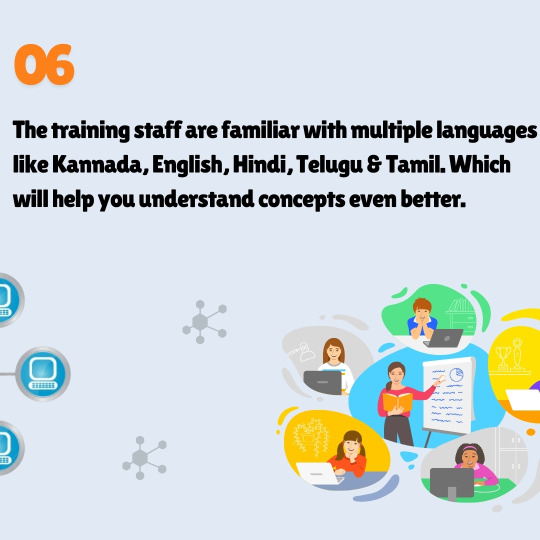
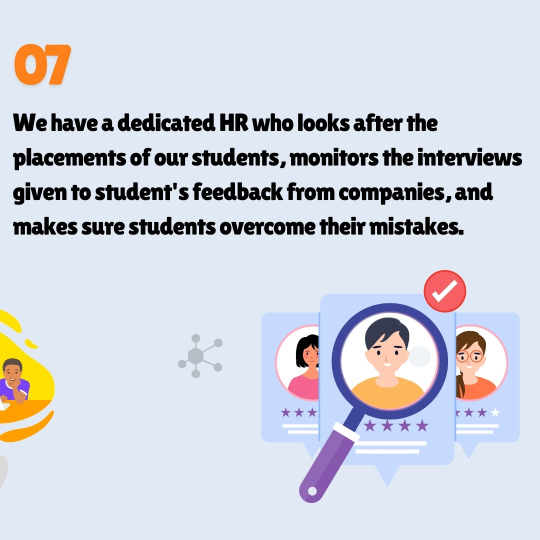

In recent years, cloud computing has established itself as one of the most popular software choices among enterprises worldwide.
Its most desirable feature is the ability to connect to it from anywhere in the globe. Furthermore, it improves operational efficiency and lowers IT costs.
Here are the top seven benefits of learning cloud computing with INNOVATIVE ACADEMY.
Visit: https://innovativeacademy.in Call us: +91 8447712333
#cloudecomputing#cloudcomputingservices#cloudcomputingsystem#cloudcomputingtraining#cloudcomputingsolution#cloudcomputingcourse#cloudcomputingarchitecture#awscloudcomputing#cloudcomputingcourses#cloudcomputingsolutions#cloudcomputingapplications#cloudcomputingtechnology#cloudcomputingfacts#learncloudcomputing#cloudcomputingisthefuture#futureofcloudcomputing
0 notes
Text
https://soundcloud.com/vaibhav-yadav-702478504/cloud-computing-and-big-data?si=7a509f3b28a242bcac6cfbc4a88a8549&utm_source=clipboard&utm_medium=text&utm_campaign=social_sharing
Cloud computing and big data is the use of internet-based applications and tools to store, manage, analyze, and share information, which can be distributed across multiple computers and servers. The use of cloud computing can provide many benefits, including cost savings, increased efficiency, and increased flexibility. However, it also brings with it some security concerns.
#cloudcomputingcourseindelhi#cloudcomputingcoursesindelhi#bestcloudcomputinginstituteindelhi#cloudcomputinginstituteindelhi#jobbasedcloudcomputingtrainingindelhi#cloudcomputingcourseinrohini#cloudcomputingcourses#cloudcomputingcourse#cloudcomputinginstitue#cloudcomputingonlineinstitute#cloudcomputingtraining#cloudcomputingjob#bestcloudcomputing#cloudcomputingservice
0 notes
Text

One of the significant Benefits of Cloud Computing is that it lets you offload some or most of the costs and effort of purchasing, installing, configuring, and managing your own on-premises infrastructure.
0 notes
Text
Cloud Computing: The Digital Revolution
Today, businesses and individuals are constantly seeking efficient, scalable, and cost-effective solutions for data storage, processing, and management. Cloud computing has emerged as the backbone of this transformation, offering flexibility, security, and accessibility. From small businesses to large enterprises, cloud technology is revolutionizing the way we interact with data, applications, and IT infrastructure.
Understanding Cloud Computing
Cloud computing refers to the delivery of computing services—including storage, processing power, databases, networking, software, and analytics—over the internet. Unlike traditional on-premise systems, where data and applications are hosted locally, cloud computing allows users to access their resources remotely from anywhere in the world. The fundamental concept behind cloud computing is “pay-as-you-go,” meaning businesses and individuals only pay for the resources they consume, reducing operational costs and improving efficiency.

Key Components of Cloud Computing
1. Infrastructure as a Service (IaaS)
IaaS provides virtualized computing resources over the internet. Users can rent servers, storage, and networking components on-demand without investing in physical hardware. Popular IaaS providers include Amazon Web Services (AWS), Microsoft Azure, and Google Cloud.
2. Platform as a Service (PaaS)
PaaS offers a cloud-based environment that enables developers to build, test, and deploy applications without worrying about underlying infrastructure. It includes tools, libraries, and frameworks necessary for application development. Examples include Google App Engine and Microsoft Azure App Services.
3. Software as a Service (SaaS)
SaaS provides fully managed applications that users can access via web browsers without requiring installation or maintenance. Common SaaS applications include Google Workspace, Microsoft Office 365, and Salesforce CRM.
Benefits of Cloud Computing
1. Cost Efficiency
Cloud computing eliminates the need for expensive hardware and IT infrastructure, allowing businesses to pay only for the services they use. This pay-as-you-go model significantly reduces capital expenditures.
2. Scalability and Flexibility
Cloud services can be scaled up or down based on demand, making them ideal for businesses with fluctuating workloads. Organizations can add or remove resources in real time, ensuring optimal performance and cost savings.
3. Enhanced Security
Cloud providers invest heavily in security measures, including data encryption, multi-factor authentication, and regular compliance audits. This ensures that sensitive information remains protected from cyber threats.
4. Remote Accessibility
With cloud computing, employees and businesses can access applications and data from anywhere with an internet connection. This has been especially beneficial in the era of remote work and global collaboration.
5. Disaster Recovery and Data Backup
Cloud solutions offer automated data backups and disaster recovery options, ensuring business continuity in case of hardware failures, cyberattacks, or natural disasters.
Industries Transformed by Cloud Computing
1. Healthcare
Cloud computing has revolutionized the healthcare industry by enabling electronic health records (EHRs), telemedicine, and AI-driven diagnostics. Cloud storage allows healthcare providers to access patient data securely and efficiently.
2. Finance
Banks and financial institutions leverage cloud computing for real-time transactions, fraud detection, and regulatory compliance. Cloud-based analytics help in making data-driven investment decisions.
3. Education
Online learning platforms and virtual classrooms rely on cloud computing for seamless content delivery, student management, and collaboration tools like Google Classroom and Microsoft Teams.
4. Retail and E-Commerce
Cloud-based solutions enable e-commerce businesses to handle high traffic volumes, optimize inventory management, and personalize customer experiences through AI and machine learning.
5. Manufacturing and Supply Chain
Manufacturers utilize cloud computing for predictive maintenance, IoT integration, and supply chain optimization, reducing costs and improving efficiency.
Emerging Trends in Cloud Computing
1. Hybrid and Multi-Cloud Strategies
Businesses are increasingly adopting hybrid cloud models, combining private and public clouds for greater flexibility and security. Multi-cloud strategies allow companies to leverage multiple cloud providers to prevent vendor lock-in.
2. Edge Computing
Edge computing reduces latency by processing data closer to the source, improving performance for applications like IoT, autonomous vehicles, and real-time analytics.
3. Artificial Intelligence and Machine Learning in the Cloud
Cloud-based AI and ML tools are enhancing decision-making, automating tasks, and driving innovation in various industries.
4. Serverless Computing
Serverless computing enables developers to build and run applications without managing infrastructure, leading to increased agility and reduced operational overhead.
5. Quantum Computing in the Cloud
Tech giants like IBM, Google, and AWS are investing in cloud-based quantum computing, which has the potential to solve complex problems in cryptography, material science, and optimization.
Challenges and Considerations
Despite its advantages, cloud computing presents certain challenges:
Security and Compliance: Organizations must ensure compliance with data protection regulations such as GDPR and HIPAA.
Downtime Risks: Cloud outages can impact business operations, making disaster recovery planning essential.
Data Privacy Concerns: Storing sensitive data in third-party cloud environments requires trust and robust encryption measures.
Cost Management: While cloud computing reduces capital costs, inefficient resource allocation can lead to unexpected expenses.
Future of Cloud Computing
Cloud computing continues to evolve, driving innovation across industries. The integration of AI, blockchain, and IoT with cloud services will redefine business models, enhance automation, and improve decision-making processes. As cloud security measures strengthen and hybrid cloud adoption grows, businesses will increasingly rely on cloud solutions for their digital transformation journeys.
ConclusionCloud computing has become an indispensable part of modern business operations. Whether it’s improving efficiency, reducing costs, or enabling remote work, cloud technology is reshaping industries and paving the way for future innovations. As organizations continue to embrace cloud computing, staying updated with the latest trends and security best practices will be key to harnessing its full potential.
0 notes
Text

Looking to advance your career in technology with cutting-edge skills? APTRON Gurgaon offers industry-leading Cloud Computing training in Gurgaon to help you achieve your professional goals. Whether you’re a beginner or a professional seeking to upskill, our comprehensive training programs cater to all levels of expertise. Get access to a robust network of hiring partners and dedicated placement support to land your dream job.
#CloudComputing#CloudTraining#AWSCertification#AzureTraining#GoogleCloud#ITTraining#CloudTechnology#APTRONGurgaon#CareerInCloud#TechEducation#GurgaonTech#CloudComputingCourse
0 notes
Text
Cloud Computing Courses: Unlocking the Future of Technology
In today's rapidly evolving digital landscape, the demand for cloud computing professionals has soared, and with it, the need for quality cloud computing courses. As businesses and organizations increasingly shift to the cloud for their IT infrastructure needs, the ability to leverage cloud technologies has become a critical skill. Cloud computing not only offers scalable solutions for data storage and processing but also facilitates innovations in areas like artificial intelligence, machine learning, and big data analytics.
Why Cloud Computing Matters
Cloud computing refers to the delivery of computing services—such as servers, storage, databases, networking, software, and more—over the internet, or "the cloud." This model allows businesses to access advanced IT capabilities without the need to invest heavily in on-premises infrastructure. With its flexible, cost-effective, and scalable nature, cloud computing has transformed industries worldwide, from finance and healthcare to e-commerce and entertainment.
Organizations can now manage their IT needs more efficiently, enhance collaboration, and accelerate innovation by adopting cloud-based solutions. As such, understanding cloud computing is no longer just an option but a necessity for professionals looking to stay competitive in today’s job market.
The Growing Demand for Cloud Computing Professionals
The rise of cloud technologies has led to a surge in the demand for skilled professionals who can design, implement, and manage cloud infrastructure. From startups to large enterprises, companies across the globe are hiring cloud architects, cloud engineers, and cloud security specialists to navigate the complexities of cloud adoption.
To meet this growing demand, various cloud computing courses have emerged, offering individuals the opportunity to develop expertise in platforms such as Amazon Web Services (AWS), Microsoft Azure, and Google Cloud. Whether you're looking to build a career in cloud architecture or cloud security, the right training can open up a wide array of career opportunities.
What Do Cloud Computing Courses Offer?
Cloud computing courses are designed to provide both foundational knowledge and hands-on experience with cloud technologies. These programs typically cover:
Cloud Fundamentals: An introduction to cloud computing concepts, including the different types of clouds (public, private, and hybrid) and their benefits.
Cloud Platforms: In-depth training on major cloud platforms like AWS, Azure, and Google Cloud, which are crucial for many businesses today.
Cloud Architecture: Learn how to design, deploy, and manage scalable cloud architectures to meet business needs.
Cloud Security: With data privacy and security being a top concern, many courses focus on cloud security best practices and compliance requirements.
Automation & DevOps: Understanding the integration of cloud computing with DevOps processes and how to automate cloud infrastructure for increased efficiency.
For those new to the field, introductory courses cover essential topics like networking, virtualization, and data storage, which form the backbone of cloud technologies. More advanced courses delve deeper into specialized areas, allowing professionals to gain expertise in specific cloud services, machine learning tools, and cloud-native applications.
The Benefits of Taking Cloud Computing Courses
Enhanced Career Prospects: With cloud computing being a cornerstone of modern business IT infrastructure, professionals with cloud skills are in high demand. Completing cloud computing courses can significantly boost your employability and open doors to new job roles and career advancement opportunities.
Higher Earning Potential: Cloud computing professionals, especially those with specialized certifications, tend to command higher salaries. According to industry reports, cloud computing is one of the highest-paying fields in IT.
Hands-On Learning: Many cloud computing courses include practical labs and projects, allowing students to gain real-world experience. By working directly with cloud platforms and tools, learners can better understand how to apply theoretical knowledge in real business scenarios.
Adaptability and Future-Proofing: The technology landscape is continuously evolving, and cloud computing remains at the forefront of this transformation. By gaining expertise in cloud technologies, you position yourself as a future-ready professional who can adapt to changing industry demands.
Choosing the Right Cloud Computing Course
When selecting a cloud computing course, it’s important to consider a few key factors:
Platform Focus: Some courses specialize in particular cloud platforms (e.g., AWS, Azure, Google Cloud), so choose one that aligns with the industry you want to work in.
Certification Opportunities: Many cloud computing programs offer certifications that are recognized by top tech companies. Earning a certification can validate your skills and increase your chances of landing a job in cloud computing.
Course Structure: Look for courses that offer a mix of theory and hands-on learning, allowing you to apply your knowledge in practical settings.
Instructor Expertise: Courses led by industry professionals or those with real-world experience can provide deeper insights into the challenges and trends in cloud computing.
Conclusion
As the world becomes more digitally connected, the need for cloud computing expertise will only continue to grow. Enrolling in cloud computing courses provides an excellent opportunity to tap into this thriving field, acquire valuable skills, and enhance your career prospects. Whether you're just starting your career or looking to upgrade your skills, these courses offer the knowledge and hands-on experience needed to succeed in a cloud-powered world.
0 notes
Text
Serverless Computing: The Next Big Thing in Cloud Technology

The cloud computing landscape is ever-evolving, constantly introducing new paradigms that shape the way businesses operate and developers build applications. One of the most groundbreaking innovations in recent years is serverless computing. This technology has quickly gained traction, promising to revolutionize how we think about deploying and managing applications in the cloud. By eliminating the need to manage infrastructure, serverless computing allows developers to focus solely on writing code, leading to faster development cycles and reduced operational overhead.
As serverless computing continues to gain momentum, the demand for professionals with expertise in this area is growing. For anyone looking to stay ahead in the industry, obtaining a cloud computing certification is a strategic move. In this blog, we'll explore what serverless computing is, how it works, and why it's considered the next big thing in cloud technology. We'll also discuss why a cloud computing certification is essential for mastering this cutting-edge technology.
What is Serverless Computing?
Serverless computing, despite its name, doesn't mean there are no servers involved. Instead, it refers to a cloud computing model where the cloud provider automatically manages the infrastructure, scaling, and execution of code. Developers write functions or small units of code, and the cloud provider handles the rest, including provisioning, scaling, and maintaining the servers.
In a traditional cloud setup, developers must manage servers, virtual machines, or containers. They are responsible for configuring the environment, scaling resources based on demand, and ensuring uptime. Serverless computing abstracts these complexities, allowing developers to focus on writing code without worrying about the underlying infrastructure. The cloud provider only charges for the actual execution time of the code, making serverless computing a cost-effective solution for many use cases.
How Serverless Computing Works
Serverless computing operates on a function-as-a-service (FaaS) model, where developers write functions that are triggered by specific events. These functions are stateless, meaning they don't retain data between executions, which allows for efficient scaling and parallel processing.
Event-Driven Architecture : Serverless computing is inherently event-driven. Functions are executed in response to events, such as HTTP requests, database changes, or file uploads. This architecture allows for highly responsive and scalable applications, as functions are only executed when needed. For instance, a function might be triggered by a user submitting a form on a website, processing the data, and returning a response. Once the function has completed its task, it shuts down, freeing up resources.
Automatic Scaling : One of the most significant advantages of serverless computing is its ability to automatically scale based on demand. Traditional cloud setups require manual scaling, where developers must provision additional resources to handle increased traffic. In contrast, serverless computing automatically adjusts the number of function instances based on the workload, ensuring that applications can handle spikes in traffic without downtime or performance degradation.
Pay-As-You-Go Pricing : Serverless computing offers a cost-effective pricing model where you only pay for the actual execution time of your code. Unlike traditional cloud models, where you're charged for reserved resources regardless of usage, serverless computing charges you only when your functions are executed. This can lead to significant cost savings, especially for applications with variable or unpredictable workloads. Understanding this pricing model is a key component of any cloud computing certification.
Simplified Operations : With serverless computing, the cloud provider handles the operational aspects of running applications, including server maintenance, patching, and scaling. This reduces the operational burden on development teams, allowing them to focus on building features and improving user experience. By abstracting these tasks, serverless computing simplifies the development process and accelerates time-to-market for new applications.
Why Serverless Computing is the Next Big Thing
Serverless computing offers several benefits that make it an attractive option for modern applications. Its ability to streamline development, reduce costs, and scale effortlessly is driving its adoption across various industries. Here’s why serverless computing is poised to be the next big thing in cloud technology:
Faster Time-to-MarketServerless computing accelerates the development process by allowing developers to focus solely on writing code. With the infrastructure management abstracted away, teams can iterate quickly and deploy new features faster. This speed is crucial in today's competitive market, where getting products to market quickly can be a significant advantage. Professionals with a cloud computing certification that includes serverless computing can help organizations capitalize on this advantage.
Reduced Operational CostsBy eliminating the need for server management and offering a pay-as-you-go pricing model, serverless computing can significantly reduce operational costs. Businesses no longer need to invest in maintaining and scaling servers, which can lead to substantial savings, especially for startups and small to medium-sized enterprises. As more organizations look to optimize their IT budgets, the demand for serverless computing expertise is expected to grow.
Scalability and FlexibilityThe automatic scaling capabilities of serverless computing make it an ideal choice for applications with fluctuating workloads. Whether you're running a simple web app or a complex data processing pipeline, serverless computing can handle varying levels of demand without manual intervention. This scalability and flexibility are critical for businesses that need to respond quickly to changing market conditions.
Innovation and ExperimentationServerless computing encourages innovation by lowering the barriers to experimentation. Developers can quickly prototype and test new ideas without the overhead of managing infrastructure. This fosters a culture of innovation within organizations, enabling them to explore new opportunities and stay ahead of the competition. A cloud computing certification can provide professionals with the knowledge to leverage serverless computing for innovation.
Conclusion
Serverless computing is undoubtedly the next big thing in cloud technology. Its ability to streamline development, reduce costs, and scale applications effortlessly makes it an attractive option for businesses of all sizes. As more organizations embrace this technology, the demand for professionals with serverless computing expertise will continue to rise.
If you're looking to stay ahead in the cloud computing industry, obtaining a cloud computing certification is a smart investment. This certification will equip you with the skills and knowledge needed to navigate the complexities of serverless computing and capitalize on its benefits. Whether you're an experienced developer or new to the field, a cloud computing certification can open doors to exciting career opportunities in this rapidly evolving landscape.
In conclusion, serverless computing is not just a trend; it's a fundamental shift in how we build and deploy applications. By understanding and mastering this technology through a cloud computing certification, you'll be well-positioned to thrive in the future of cloud computing. Don't miss out on the opportunity to be part of this revolution—start your journey towards certification today!
#technology#data security#ai#Cloud Computing#cloudtechnology#futuretech#CloudComputing#ServerlessArchitecture#CloudSecurity#TechInnovation#CloudDevelopment#FutureOfCloud#cloudcomputingcourse#serverless#serverlesscomputing
0 notes
Text

As businesses increasingly move to the cloud, the demand for skilled cloud professionals is at an all-time high. Our Cloud Computing Training in Noida is tailored to equip you with the skills necessary to excel in this dynamic field. Whether you are a beginner or an experienced IT professional, our course covers everything from the basics to advanced cloud concepts, ensuring you are industry-ready.
#CloudComputing#CloudTraining#CloudComputingCourse#APTRONSolutions#NoidaTraining#CloudTechnology#CloudCertification#GoogleCloud#ITTraining
0 notes
Text

Cloud Computing Course With AWS
Elevate your career with our Cloud Computing with AWS self-paced course! Over 80 hours, you'll gain in-depth knowledge and hands-on experience with AWS, the leading cloud platform. 💻 Equip yourself with the skills needed to thrive in the rapidly evolving tech landscape.
Link to get Registered : https://dicecamp.com/cloud-computing-course-with-aws-
#dicecamp#datascience#cloudcomputingonlinecourse#cloudcomputing#cloudcomputingcourse#selfpacedcourse#careertest
0 notes
Text
Join our comprehensive Cloud Computing Expert MasterClass designed to equip you with advanced knowledge and practical skills in cloud technology. Whether you're an IT professional looking to deepen your expertise or a beginner aiming to enter the cloud computing field, this MasterClass covers everything you need to become a cloud expert.
#CloudComputing#CloudExpert#MasterClass#CloudTechnology#CloudTraining#CloudSkills#ITTraining#TechEducation#CloudCertifications#CloudComputingCourse#InfosecTrain#CloudSecurity#AWS#Azure#GoogleCloud#learntorise
0 notes
Text
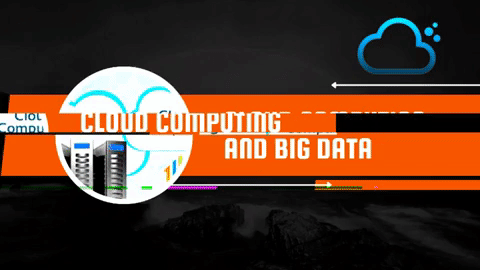
Cloud computing and big data is the use of internet-based applications and tools to store, manage, analyze, and share information, which can be distributed across multiple computers and servers. The use of cloud computing can provide many benefits, including cost savings, increased efficiency, and increased flexibility. However, it also brings with it some security concerns.
#cloudcomputingcourseindelhi#cloudcomputingcoursesindelhi#bestcloudcomputinginstituteindelhi#cloudcomputinginstituteindelhi#jobbasedcloudcomputingtrainingindelhi#cloudcomputingcourseinrohini#cloudcomputingcourses#cloudcomputingcourse#cloudcomputinginstitue#cloudcomputingonlineinstitute#cloudcomputingtraining#cloudcomputingjob#bestcloudcomputing#cloudcomputingservice
0 notes
Text
Cloud computing course in pitampura is a course on cloud computing. It is a mix of theory and practicals. The course aims to provide the students with a basic understanding of cloud computing, its applications and the best practices in cloud computing.
#cloudcomputingcourseinpitampura#cloudcomputingcoursesinpitampura#bestcloudcomputinginstituteinpitampura#cloudcomputinginstituteinpitampura#jobbasedcloudcomputingtraininginpitampura#cloudcomputingcourses#cloudcomputingcourse#cloudcomputinginstitue#cloudcomputingonlineinstitute#cloudcomputingtraining#cloudcomputingjob#bestcloudcomputing#cloudcomputingservice#SoundCloud
0 notes
Text

0 notes
Text
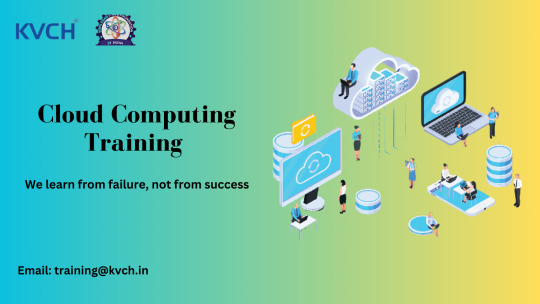
0 notes